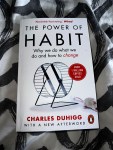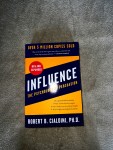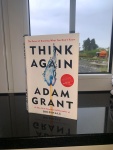
A young woman walks into a laboratory. Over the past two years, she has transformed almost every aspect of her life. She has quit smoking, run a marathon, and been promoted at work. The patterns inside her brain, neurologists discover, have fundamentally changed. Marketers at Procter & Gamble study videos of people making their beds. They are desperately trying to figure out how to sell a new product called Febreze, on track to be one of the biggest flops in company history. Suddenly, one of them detects a nearly imperceptible pattern—and with a slight shift in advertising, Febreze goes on to earn a billion dollars a year.
The only reason why I’ve read this book was because I’ve heard a lot of good about this book and the majority of reviews of this book on Goodreads are very positive in the 4-star and 5-star categories. But after reading this book I gotta admit that it wasn’t as good as a lot of people on Goodreads claim it is. But of course I’m gonna explain everything in this review so lets get into it.
This book is interesting and enjoyable. Because it talks about how to actually change our more negative habits like lets say smoking, drinking or whatever else you classify as a “bad habit”.
But I need to admit here that this book seemed to me like a mix between “Thinking, Fast and Slow” by Daniel Kahneman and “Atomic Habits” by James Clear. Because this book talks a lot about the same things those 2 books talk about. But this book says very similar things which “Thinking, Fast and Slow” by Daniel Kahneman and “Atomic Habits” by James Clear say but in different way.
After reading this book I gotta admit that if you have read both “Thinking, Fast and Slow” by Daniel Kahneman and “Atomic Habits” by James Clear, then you can easily skip this book because those two books I’ve mentioned explain the process of replacing bad habits with good habits.
This book has a fair share of anecdotes and at times those anecdotes don’t support or go along with a particular arguments the author attempting to tell us about. Which really made me think about whats the point of having those anecdotes if they don’t go along with what the author is trying to tell us.
The other thing which really annoyed me, is that the author explains everything painfully clear like the readers of this book are a bunch of toddlers who are only learning how to form coherent thoughts. Which is the main reason why I said that the 2 books I’ve mentioned above are much better than this book because they dont treat their readers like some idiots who need to have everything explained on a toddler level.
The thing you have to know about this book is that it is not a self-help book as Goodreads claim it is. The author doesn’t give us any tips on how to actually change / improve our habits. instead this book is more of an analysis / essay about habits and how companies like target use habits to influence our lives. So keep that in mind, because if you are looking for a self-help book on how to improve your habits then reading “Atomic Habits” by James Clear is a much better choice than this book is.
The writing style is okay for the most part, but when the author tries to explain something to us the writing style almost drop to an toddler level but I’ve already said that above.
At the same time this book takes over 350 pages to explain something which could be done in 2 or 3 pages. The thing which the author is trying to tell us in those 350 pages is that if you want to change or make new habits you should be consistent with what habits you want to make. Like if you want to go to sleep at 10 pm each night then you should try to go to sleep at around 10 pm most nights rather than hope you will fall asleep at 10pm.
But this book makes some good points here and there, which really is the only thing which made me give this book a 3 star rating instead of a 2 star rating.
I Give This Book 3 / 5










